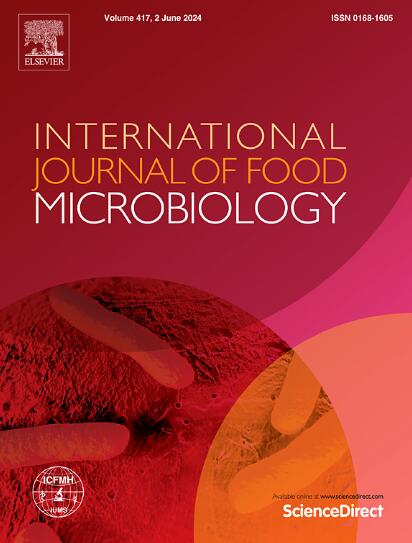发酵时间和面团成分对液体酸面团起动剂稳定性的影响
IF 5
1区 农林科学
Q1 FOOD SCIENCE & TECHNOLOGY
International journal of food microbiology
Pub Date : 2024-10-08
DOI:10.1016/j.ijfoodmicro.2024.110932
引用次数: 0
摘要
工业化规模的酸包制作需要坚固耐用、性能良好的发酵剂,这样才能为产品带来诱人的特性。与脱水的发酵剂相比,液态发酵剂的活性可加快发酵过程。本研究调查了三种液体酸包粉起发酵剂在贮藏过程中的稳定性,以及延长发酵时间、添加泻盐麦芽粉和中和剂(CaCO3)的影响。在 16 周的冷藏期间,对酸包粉起发酵剂在三个时间点的微生物活力和代谢活性进行了评估。在 16 周的冷藏过程中,两种酸面团发酵剂都表现出了令人满意的乳酸菌活力(7 log CFU/g)和新陈代谢稳定性。引入麦芽粉和 CaCO3 后,第三种酸包粉起发酵剂的存活率在 8 周内下降到 7 log CFU/g,此外还显示这种酸包粉起发酵剂在冷藏期间具有持续的新陈代谢活动。延长发酵时间会影响游离氨基酸谱,而调整酸面团起动菌配方则会导致不同的真菌微生物群以及可发酵基质(麦芽糖)、有机酸(乳酸)和芳香化合物(酒精和醛)水平的增加。本文章由计算机程序翻译,如有差异,请以英文原文为准。
The impact of fermentation length and dough composition on the stability of liquid sourdough starters
Sourdough breadmaking on an industrial scale requires robust, well-performing starters that bring attractive characteristics to the product. The active nature of liquid starters provides a faster fermentation process compared to their dehydrated counterparts. However, liquid sourdough starters require meticulous management in order to maintain stability and functionality during cold storage at 4 °C.
This study investigated the stability of three liquid sourdough starters during storage and also the impact of prolonged fermentation, the addition of diastatic malted wheat flour, and a neutralising agent (CaCO3).
The sourdough starters were evaluated for their microbial viability and metabolic activity at three individual time points during 16 weeks of cold storage. The microbial composition was analysed using culture-dependent and culture-independent methods, and metabolic changes were investigated using chromatographic methods.
Two types of sourdough starter showed satisfying viability of lactic acid bacteria (> 7 log CFU/g) and metabolic stability throughout 16 weeks of cold storage. The introduction of malted wheat flour and CaCO3 caused a decline in viability to <7 log CFU/g within 8 weeks in the third sourdough starter type and additionally revealed an ongoing metabolic activity of this sourdough starter during cold storage.
Prolonged fermentation influenced the free amino acid profile, whereas adjusting the sourdough starter formula resulted in a different fungal microbiota and increased levels of fermentable substrates (maltose), organic acids (lactic acid), and aromatic compounds (alcohol and aldehydes).
These findings provide stakeholders and researchers in sourdough fermentation technology with new insights concerning the stability of cold-stored liquid sourdough starters.
求助全文
通过发布文献求助,成功后即可免费获取论文全文。
去求助
来源期刊
CiteScore
10.40
自引率
5.60%
发文量
322
审稿时长
65 days
期刊介绍:
The International Journal of Food Microbiology publishes papers dealing with all aspects of food microbiology. Articles must present information that is novel, has high impact and interest, and is of high scientific quality. They should provide scientific or technological advancement in the specific field of interest of the journal and enhance its strong international reputation. Preliminary or confirmatory results as well as contributions not strictly related to food microbiology will not be considered for publication.

 求助内容:
求助内容: 应助结果提醒方式:
应助结果提醒方式:


